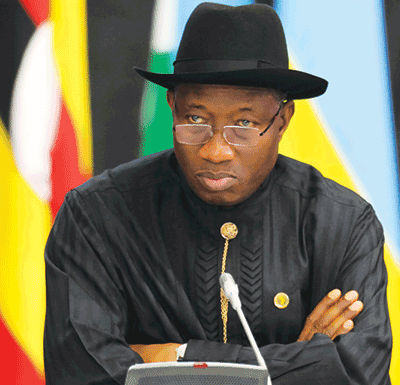Senior Correspondent, ISHAYA IBRAHIM, examines the motive the United States (U.S.) is reluctant in selling critical arms to Nigeria to crush the Boko Haram insurgency.
In 2005, a think-tank of American government comprising Central Intelligence Agency (CIA) officials, foreign policy experts, military chiefs and politicians, met to discuss Nigeria’s security situation.
Scathing report
Their conclusion was disheartening: Nigeria could disintegrate in 2015, if nothing was done to stem the tide of religious schism in the country.
The report came when Nigeria’s North was the epicentre of religious crises, while the South agonises over ethnic strife.
The government of President Olusegun Obasanjo, at the time, called the authors of the report “prophets of doom”.
Apparently still enjoying some cosy relationship with Nigeria courtesy of its sweet crude, the United States government disowned the report, saying it was the opinion of a private outfit.
Target for ruin
Mohammed Haruna, a journalist, in his newspaper column, quoted one Gordon Duff, a Marine Vietnam veteran, a combat infantryman, and Senior Editor at Veterans Today, as saying that Nigeria has been targeted for destruction by outside powers.
“The terror group, Boko Haram, was real. But in its current formation, it was a proxy of outside powers who plan to balkanise Nigeria, simply another domino to fall as have so many others. Nigeria is Africa, the most populous country, the one with most oil and gas wealth, the greatest economic potential, the biggest potential market. Thus, Nigeria is a target.
“Christian Nigeria, Duff said, is being set up, not just to fight a ‘terror group’ in the North, but to take on all of Islamic Africa, to draw them into a war that will bring more players, America, for one, into another endless cesspool.”
Few weeks to 2015, Boko Haram seemed determined to bring the doomsday prophecy into reality. And the U.S. is not helping Nigeria tame the monster. It refuses to sell critical military equipment to Nigeria, which could help crush the insurgency, citing Nigeria’s dismal human rights record as reason.
Frustrated
The Nigerian Ambassador to the U.S., Ade Adefuye, expressed Nigeria’s frustration.
He said: “The U.S. Government has up till today refused to grant Nigeria’s request to purchase lethal equipment that would have brought down the terrorists within a short time.
“We find it difficult to understand how and why, despite the U.S. presence in Nigeria with its sophisticated military technology, Boko Haram should be expanding and becoming more deadly.”
Shortly after, Nigeria cancelled an arrangement it had struck with the U.S. to train a battalion of its army.
But the announcement came from the U.S.
“At the request of the Nigerian government, the United States will discontinue its training of a Nigerian Army battalion,” the U.S. government, through its embassy in Abuja, said in a statement.
In its response, the American government said it has supported Nigeria to the extent its law permits, and accused the Nigerian security forces of human rights violations.
The U.S. said its laws disallow sale of arms to countries with such human rights record.
Bad record
But the fact is, the Nigerian army has a baggage of human rights record. In the past, it would sack communities that harbour Boko Haram operatives who kill its men. In some cases, even teenagers are not spared when the military engages in such punitive mission.
An online news website, Realnews, reported in its November 2012 edition of such actions. “On September 14, 2012, the Boko Haram sect was said to have provoked JTF (Joint Task Force) operatives into committing arson when the force lost two of its men at Layin Tanki, (Tanki Street) in Gwange. Within minutes, the JTF cordoned the area and allegedly shot at anybody within the vicinity.”
What else does U.S. want?
But the military seems willing to purge itself from such unprofessional conducts. In the last couple of weeks, it has released suspected members of the sect being held without charges. It has also begun to court-martial its men who indulge in human rights abuses.
So, what else does the U.S. want? analysts queried.
Early in September, TheNiche had sought answers on the reason the U.S. refused to deploy its satellite and drone capability to aid Nigeria bridge its intelligence gap.
The U.S., through its embassy’s spokesperson, Sean J. McIntosh, evaded the aspect of the question on ‘intelligence assistance’, but disclosed that his country has given Nigeria over $2 billion between 2012 and 2014.
Looking elsewhere
Already, Nigeria has turned to Russia for arms supply, according to a report in The Nation, a Nigerian privately owned newspaper. Quoting a government official, it added: “We have opened up negotiation with Russia for arms bail-out. We want to buy military hardware from them. More countries are also interested in assisting us. We need this help urgently now.”
Raison d’etre
In an interview published in TheNiche of September 14, 2014, Alaba Ogunsanwo, a professor of international relations at Lead City University, Ibadan, and former Nigerian Ambassador to Belgium, said the reluctance of the U.S. to share intelligence with Nigeria may not be unconnected with reports that Boko Haram has infiltrated the administration of President Goodluuk Jonathan.
“What I saw in the newspaper as the reason given was that the Nigerian side was porous and that if they (U.S.) give such information, they are not sure whether the information they are giving out will be to sympathisers of Boko Haram within the Nigerian Armed Forces,” Ogunsanwo explained.
“And they have the right to do that. Remember that our own president stated that Boko Haram sympathisers were everywhere. They were in the armed forces, within his cabinet; so, if he said that, then the U.S. intelligence people are saying, this information, if we pass it on, they are not sure if they are passing it to somebody who has sympathy for Boko Haram. That is their position.
“This is based on what the newspapers are reporting. What the newspapers are reporting cannot be said to be secret; it is in the public domain. The embassies send this back home.
“All the embassies have intelligence officers within them, and, therefore, they know what is going on when they look at our newspapers. They get information from there. To that extent, they (their home countries) know what is going on.”
Casting pearl before swine?
In the same edition of the paper, Akin Oyebode, a professor of international law, said Nigeria has failed to get its acts in order, the major reason America is reluctant to sharing information with it.
Said he: “It’s not only the U.S. that promised help. Britain promised, France promised, even Israel promised. But it seems to me that they think they might be casting pearl before swine, because the Nigerian state itself has not demonstrated sufficient capacity.
“They are also humiliating the Nigerian military. We’ve heard stories of desertion, what some apologists have called tactical manoeuvre – 500 Nigerian soldiers seeking refuge in Cameroon, suffering the indignity of being disarmed and being treated like a ragtag army.
“Quite sincerely, Nigeria has not demonstrated sufficient panache in terms of putting its house in order. When you show great resolve, then you can ask for help.
“The Yoruba have a saying that the man who wants his load lifted into his head with the help of others will, at least, bring the load up before people will help him. Nigeria has not demonstrated sufficient know-how, capability, and resolve to wrestle the Boko Haram.
“I am not making an apology for the West; I know the United States has drones stationed in Niger. You saw what the United States did to Al-Shabbah with those drones, killing their leaders. Israel, you know what they did to Hamas in Gaza.
“And then these countries have satellite capability to pinpoint movements and location. So, you asked a very important question – why are these countries not availing Nigeria of superior intelligence, superior materiel and superior ability to organise?
“It’s a question that should border every patriot. Do they wish us bad or do they want Nigeria to endure a low intensity conflict that will wear us down? Who really is behind Boko Haram? We have to know. These people are not wizards. At least, human beings are helping them,” the professor said.
Last line
Dr. Tunde Oseni, lecturer at the Department of Politics and International Relations, Lead City University, said it is a diplomatic row with possible dire consequences.
“One would expect that the U.S.-Nigeria Bilateral Commission and the respective diplomatic missions of both countries would have been able to prevent such a crisis.
“However, Nigeria may need to get its military assistance from other countries such as Russia, pending the resolution of the misunderstanding between the two old friends. Globalisation requires that countries should have multiple allies to prevent total disappointment in situations like this,” he submitted.
Ogubundu Nwadike, a public affairs analyst, said Nigeria could still afford to contain the Boko Haram insurgency without the support of the U.S.
“After all, Nigeria’s foreign policy thrust at its existing non-allied status may never expose her to such situation that it must need the U.S. military support. And it must not be forgotten that Nigeria and U.S. have a wide range of multilateral pacts to protect. So I don’t think Nigeria has anything to worry about in the circumstance.”














